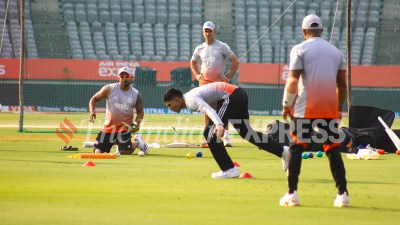Feasting on Bhagwat
Whenever Arjuna Ranatunga finds himself on a sticky wicket -- increasingly common these days -- he picks up a squabble to distract his op...

Whenever Arjuna Ranatunga finds himself on a sticky wicket 8212; increasingly common these days 8212; he picks up a squabble to distract his opponents. When Conchita Martinez, a former Wimbledon champion, finds herself losing, she calls a time-out for injury. Sonia Gandhi is not famed for her sporting prowess, nor yet for her sportsmanship, but she seems to have picked up a trick from some athletes.
The Congress president will never have the guts to admit it, but she grievously miscalculated over Bihar. Precisely four weeks ago, I wrote in this column that if Sonia Gandhi made the wrong choice the blood of unavenged Narayanpur would lie on Congress hands. Believe me, I have never been more unhappy to be proven correct. The only difference is that today there has been one more massacre, the third in this calendar year.
But Sonia Gandhi, whose wilful obstinacy stood between justice and Bihar, cannot say she was wrong. Nor can she afford to keep quiet, thus tacitly admitting her error. She must therefore create adiversion to feed public attention until the dead of Bihar are forgotten.
But where will she find an issue? Can the Congress president attack the Prime Minister8217;s bus trip to Lahore? Will she dare to criticise the Budget, or even precise provisions thereof? Does she oppose the Union Government8217;s handling of the Cauvery issue? Is she going to follow the American line and insist on India signing the Comprehensive Test Ban Treaty?
Any of those will be political suicide, and Sonia Gandhi, however little she cares for the victims of Jehanabad, is exceedingly cautious about her own skin. She will, therefore, settle for whatever tools come to hand. And the only thing that came up was the sacking of Admiral Vishnu Bhagwat.
So the Rajya Sabha was stalled for days on end as the Opposition benches howled and screamed for a Joint Parliamentary Commission. But why should we blame the Opposition as a whole? It is the Congress that is the single largest party in the Upper House of Parliament. That, after all, is whyRabri Devi is back in Patna. And so the Congress must take the blame for this bizarre waste of public money as Rajya Sabha proceedings were stalled for days on end.
I shall admit for argument8217;s sake that Parliament has a right to discuss the dismissal of Vishnu Bhagwat. So much has been readily conceded by the Treasury benches. All they said was that there was no need to constitute a Joint Parliamentary Committee immediately, without any discussion by either House. Sharad Pawar and Manmohan Singh, the leaders of the Congress in the two Houses, had agreed. But Sonia Gandhi couldn8217;t afford to let peace prevail.
What were the issues the Congress president deemed less important than Vishnu Bhagwat? Let us see, her footsoldiers did not allow the Rajya Sabha to discuss the Railway Budget. And for the first time in history the Rajya Sabha was not allowed to debate the Union Budget.
Mercifully, Dr Ambedkar and the others who wrote the Constitution had foreseen such an eventuality. So they put in Article 109 ofthe Constitution which prevents the country from descending into chaos if the Opposition tries to block a popularly-elected government in the Upper House. The Rajya Sabha has no right to veto a money bill. It can discuss and debate, but it cannot change what the Lok Sabha has already approved. If the Rajya Sabha does not approve the Budget within fourteen days, it is deemed to have been automatically passed.
But look at the sheer irresponsibility. During the election campaign 8212; several times thereafter too 8212; Congress spokespersons delighted in describing the BJP as a party with a one-track mind. 8220;You are only interested in Ayodhya,8221; they would say, 8220;what are your policies on the economy, on foreign policy, on defence?8221;
This was always rather silly. But now the Congress is well and truly hoist on its own petard. The Union Budget, a small matter of spending Rs. 150,000 crore or so, is ignored altogether. The coldblooded murder of innocent men in rural Bihar cannot be discussed. No, according to theCongress the only important issue confronting the nation today is the sacking of Vishnu Bhagwat and everything else must play second fiddle.
Money bills are shielded by the foresight of the founding fathers. But there are other pieces of legislative business too, things that do require the sanction of the Rajya Sabha to become law. Such as what? Several come to mind, but I am content to name but two.
Everyone talks about corruption. But how does the Congress react when the time comes to actually do something about it?
The chief defence against political interference in the work of investigating agencies is the Central Vigilance Commission. It possesses the right to supervise even the Central Bureau of Investigation. Legislation to put the independence of the Central Vigilance Commission on a statutory basis was expected to be passed by Parliament. An ordinance had been issued to that effect, but it is due to lapse on April 4th.
There was nothing controversial about the proposed legislation. Thegovernment was acting at the express suggestion of the Supreme Court itself. Sharad Pawar, by virtue of being leader of the Opposition, is an ex officio member of the body that chooses the Chief Vigilance Commissioner. Finally, Chief Vigilance Commissioner Vittal has an excellent record.
Again, as with the Budget, there may be a loophole. The Supreme Court had ruled that its own judgment would be the law of the land until Parliament had its say. So the Central Vigilance Commissioner shall remain. But there is no such shield for Prasar Bharati. The Bill has been approved by the Lok Sabha, but the Rajya Sabha is again the stumbling block.
The past couple of weeks have not been an advertisement for the bicameral system. The Budget ignored. The Railway Budget not discussed. The Prasar Bharati and Vigilance Commission bills not passed. And all in the name of Vishnu Bhagwat.
8220;When beggars die, there are no comets seen; the heavens themselves blaze forth the death of princes.8221; Shakespeare was only halfcorrect. There were indeed fireworks in Delhi after the death of the poor in Bihar. But yes, they were not in mourning.
- 01
- 02
- 03
- 04
- 05































